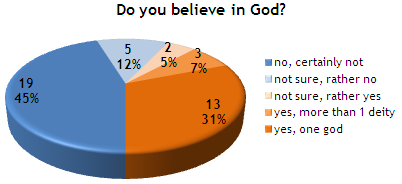 First, this post is about the Misanthrope’s blog carnival (German) about the original “Gretchen’s question”
First, this post is about the Misanthrope’s blog carnival (German) about the original “Gretchen’s question”
Gretchen: “How do you feel about religion? Tell me, pray. You are a dear, good-hearted man, but I believe you’ve little good of it to say.”
(Faust, part I, verse 3415)
Of course that’s a topic that you can easily discuss and quarrel about and which has led to way too many religious wars. Let’s hope that e.g. the comments here at Konna’s coincidentally matching post (German) won’t get out of hand like this. ![]()
As mentioned here from time to time, I’m an atheist. Of course I don’t mind if others believe, as long as they don’t strive to actively evangelize me or others or seriously harm them or even, as in case of some fundamentalists, want to punish for non- or other-believing; and I’m not too happy about spreading too much antiscientific nonsense like creationism, either…
I need no god, no heaven and especially no church; not even to find a “meaning of life”… what’s the meaning of life for me? Short answer: Life! (And I don’t mean that in an egoistic way.)
Now some – like e.g. Wu-Lan-Tong – may mention:
“But don’t atheists believe, too?
They believe in nothing, they say.
That, too, is believing, I say.”
I don’t see it that way. Believers “must” believe, have faith in something – in the existence of a higher power, in miracles or other phenomena, for this consideration can be extended towards the paranormal and various pretended supernatural pgenomena –, which secludes itself from rational, scientific access. Atheists – and, with aformenetioned topical extension, skeptics – can do without the assumption of or the belief in such “supernatural” elements simply from the rational side, all pragmatically, since there are simpler, more coherent explanations.
If you want to call this trust in the scientific point of view as “faith” or “belief”, you have to take a very far stretched definition of these words which is lightyears away from the faith that’s the basis for religion; mixing them up must, in a sense, lead to misunderstandings.
For this, see also Phil Plait’s extensive explanation “Is science faith-based?” – you just need the simple assumption that the universe obeys a set of rules (and that you can deduce these by observation) – and the long discussions there…
About the (un-)provabilities of phenomena – and accompanying problems – (and a few other things) I had already written my article based on the Uri Geller interviews on ProSieben.de: “I believe we have been brought here from other planets”
Proof and faith issues and the strange thoughts of Uri Geller.
Finally (for the first part of this post) let me mention the small poll I had here on the sidebar last autumn; its 42 participants voted like this:

 Let’s move on to the other part of the title – astrology, somewhat also as an example for superstition, which I personally don’t think much of, either, “of course”. The magazine Gehirn & Geist (brain and mind) had a poll (which I had mentioned in my links of the week last December) about “What do you think of the power of the star?“ – 464 people participated, and a total of 35% believe that zodiac signs reveal at least something about people. The entire result can be viewed/downloaded here (German).
Let’s move on to the other part of the title – astrology, somewhat also as an example for superstition, which I personally don’t think much of, either, “of course”. The magazine Gehirn & Geist (brain and mind) had a poll (which I had mentioned in my links of the week last December) about “What do you think of the power of the star?“ – 464 people participated, and a total of 35% believe that zodiac signs reveal at least something about people. The entire result can be viewed/downloaded here (German).
The corresponding article “Die Kunst der Sterndeuter” (“the art of the astrologers”) can also be downloaded freely. I’d like to mention (and translate) two quotes from it:
“The Australian Geoffrey Dean, who gave up his astrological profession due to sobering findings, analyzed until today over 50 […] attribution studies. His conclusion: His former colleagues were not able to attribute a hososcope that has been created according to exact birth data to a personality profile or a case history any better than a random number generator.”
Also, the fact that so many people consider newspaper horoscopes – which aren’t even created according to exact birth data – appealing is of course based on how they are written:
The tricks of the pros
How do newspaper astrologers manage to have so many readers find themselves in their short texts? Germanist Katja Furthmann identified in 2006 in her doctorate seven linguistic artifices:
- exhaustive topic presentation, for instance by combining opposites
- use of abstract terms like chance, problem …
- relative and ambiguous formulation
- integration of timeless truths
- clearness through pictorial formulation
- astrologic technical terms
- staging proximity and emotional affection.
Furthmann, K.: Die Sterne lügen nicht. Göttingen: Vandenhoeck & Ruprecht 2006
And let me also mention my post about a magazine article about fortune telling on TV.
juliaL491 2008-02-25 at 8:41 912 Comments
quote
Oh, das wird immer besser mit den Beiträgen zum Thema. Es gibt noch eine Blogparade, diesmal speziell von/für Atheisten. Vielleicht kannst du den Beitrag hier auch noch einreichen.
Ich stimme dir natürlich zu und bin auch dabei einen Beitrag zu verfassen, erstens wegen den beiden Blogparaden und weil ich ja gerade “The God Delusion” lese.
und bin auch dabei einen Beitrag zu verfassen, erstens wegen den beiden Blogparaden und weil ich ja gerade “The God Delusion” lese.
cimddwc2 2008-02-25 at 9:18 6457 Comments
quote
Bei der “gottlosen Veranstaltung” bin ich schon mit dem Geller-Interview-Artikel „Ich glaube, dass wir von anderen Planeten hierher gebracht wurden“ dabei.
Pas3 2008-02-25 at 17:05 23 Comments
quote
hm, der Uri-Geller-Beitrag ist mir grade zu lange…. Wo genau steht da deine Auffassung drin?
für alles? Der Urknall ist immer noch nicht vollständig geklärt/bewiesen, außerdem warum könnte das nicht Gottes Werk sein?. Und woher kommen die ganzen Naturkonstanten? Warum sind sie so und nicht anders? Ich interessiere mich sehr für diese Fragen, aber beantworten konnte sie mir noch keiner wirklich überzeugend. Und da, wo die Wissenschaft nichts weiß (sie wird nie alles wissen) hat meiner Überzeugung nach Gott seine Finger im Spiel (gehabt). Aber wie gesagt, ich kanns nachvollziehen, dass das nicht befriedigend erscheint.
genau diesen “Satz Regeln” meine ich. Woher kommt der, wer hat sie aufgestellt?
Auch wenn es der Wissenschaft darum nicht geht (ich habe den englischen Artikel da nur überflogen), kann man sich diese Frage und wird man sie sich immer stellen können. Die ganzen meisten (es gibt ja auch böse Dinge, Atombombe etc…) Erungenschaften der Wissenschaft finde ich gut.
Aber im Prinzip ist es auch eine Art Glauben. Nicht so richtig, aber eher Annehmen, falls wir es so sagen. Wir nehmen an, es ist so, bis wir etwas anderes entdecken und dann finden wir einen neue Formel. Bis wir wieder was anderes entdecken…
Und die Fragen, die die Wissenschaft offen lassen muss lassen sehr wohl Glaubensspielräume. Wenn mir jemand was anderes beweist, dann gerne, aber wenn nicht, dann glaube ich weiter das, was ich jetzt glaube. Denn bis jetzt habe ich (wie die Wissenschaftler) die Erfahrung gemacht, dass es für mich gut ist und darauf gründet sich mein Vertrauen (womit ich Gottesglauben eher übersetze).
Ach ja und zu den Horoskopen: Meistens sind sie positiv formuliert, denn das lesen die Leute gerner ääh lieber. Und schon mal auf BTV/Astro TV geschaut? Die Fragen die Anrufer geschickt hintenrum aus und erzähĺen denen nachher nur das, was sie eben gehört haben…
cimddwc4 2008-02-25 at 17:50 6457 Comments
quote
Zum Geller-Artikel: ums Drachen-Bildchen herum geht’s ums Beweisen; du kannst auch nach Carl Sagan suchen. (Und am Ende spreche ich auch noch das allseits beliebte Theodizee-Problem an.)
Sicher, der Anfang von Allem (ob jetzt Urknall, Membrankollision (worin?), Endlosschleife, …) ist eine Frage, die sich schwer klären lassen wird, und wer will, kann einen Gott dahinter sehen. Muss man aber nicht…
Wären sie so anders, dass es keine Beobachter wie uns geben könnte, gäbe es uns nicht, die wir darüber nachdenken können. Dieses “schwache anthropische Prinzip” kann man auch gut mit Multiversen-Theorien kombinieren, denen zufolge es viele weitere “Universen” gibt, in denen die Konstanten und Naturgesetze anders sein können, auch ohne dass es “jemanden” gibt, der sie aufstellt.
Mir scheint, solche kosmologischen Probleme bieten gewissermaßen eine “letzte mögliche Nische” für einen Schöpfergott, wenn man bei solchen kosmologischen Kenntnissen denn an einen glauben will. Wobei man dann natürlich fragen könnte, wo und warum dieser wiederum herkommt…
(Technischer Hinweis: Mehrere Zeilenumbrüche bringen nichts, es sei denn, du schreibst zwischendrin ein
– alternativ gibt’s Trennlinien mit<hr/>.)Pas5 2008-02-27 at 16:50 23 Comments
quote
das schwache anthropische Prinzip bereitet mir seit ich vor ein, zwei Jahren davon gehört hat, Probleme… Es ist ja keine “richtige” Begründung^^
und woher Gott kommt, tja da bin ich überfragt, wahrscheinz hat er sich selbst erschaffen :p
Trackback: 49 Suns6 2008-03-02 at 15:55
Pingback: DER MISANTHROP » Blog Archiv » Gretchenfrage und Gotteswahn: The List7 2008-03-17 at 7:01
Pingback: Atheismus als Gretchenfrage - Sajonara.de - Internetmagazin8 2008-03-17 at 22:29
Pingback: Gehäufte Unvernunft :: cimddwc9 2008-05-29 at 20:49
losthere9910 2009-03-07 at 5:26 1 Comment
quote
im lost on this cyder space